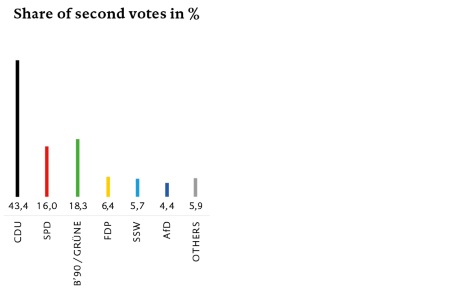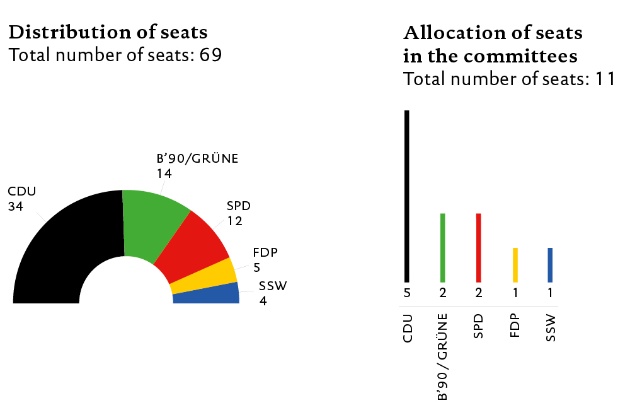Article 17 of the Constitution of Schleswig-Holstein states that “Members of Parliament represent the entire people. In discharging their duties they shall be governed only by their conscience and shall not be subject to any orders and directives.” This article also specifies the constitutional rights that legislators are endowed with, namely the right to
- submit motions and ask questions in Plenary and in the parliamentary committees and
- cast their vote in elections and decisions.
The Act on the Legal Status of Members of the Schleswig-Holstein State Parliament contains precise details on the legal status that MPs have. Among other things, it prohibits any dismissal from employment with or without notice on the grounds of the acceptance or exercise of a parliamentary mandate. This protection against dismissal begins when a candidate runs for State Parliament and continues up to one year after the MP has left office.
Reconciling one’s work as an MP with the last job one has held can be quite difficult. Moreover, the regulations regarding the incompatibility between political mandate and profession may apply in some cases: While holding office, Members of Parliament may not work as civil servants or employees of a Supreme Land Authority nor may they head any State Agency or Authority, such as a school, a police station or a police department directly subordinated to the Ministry of the Interior.
Other positions that Members of Parliament are barred from holding during their term of office are professional judge and public prosecutor at the Land level. They are not allowed to work as salaried board members of public corporations or public-law institutions that are accountable to the State of Schleswig-Holstein nor are they permitted to serve in other full-time, salaried, elected public positions, such as District Administrator or Mayor. Soldiers elected to the State Parliament may not simultaneously pursue their professional career.
The following parliamentary bodies are important for the work of every Member of Parliament:
The Plenary consists of the entirety of all the Members of the State Parliament of Schleswig-Holstein. As a rule, plenary sessions are conducted three days a month, ten times per year in the plenary chamber of the State Parliament. The Plenary is the central place for public debate and binding decisions made by the Parliament. Before a political position is presented publicly in this arena, however, it goes through various stages of parliamentary work: the working groups of the parties represented in parliament, the parliamentary groups themselves and the committees. Preliminary decisions for the debates and subsequent votes in Plenary are thus made in these bodies. The debates in the plenary sessions of Parliament are, therefore, not primarily designed to convince MPs from other parliamentary groups. Rather, discussions in the Plenary aim to clarify political alternatives for the public and the media. For this reason, the Plenary is also called “Parliament’s shop window” to the public.
A parliamentary group is formed by all MPs of one party. As a rule, the parliamentary groups convene once a week. Within each parliamentary group a kind of division of labour prevails: Expert speakers concern themselves with various policy fields, working groups deal with key subject areas, such as education, finances, and social affairs. Generally speaking, the decisions taken by a parliamentary group are represented jointly in the plenary sessions (parliamentary group discipline).
Committees are the parliamentary bodies that concern themselves with different subject areas. They convene for meetings as required by the tasks assigned to them by the Plenary. In contrast to plenary sessions, which are always held in Kiel, the committees travel to other locations from time to time to gather relevant information “in the field”. IIn its 19th legislative period, the Parliament of Schleswig-Holstein has nine standing committees with 11 members each, which reflects the majority situation: the CDU (five seats) and THE GREENS (two seats) can use their majority also in the committees to prevail push through their decisions against the opposition. The other seats in the committees are held by the SPD (two), the FDP and the SSW (one each). The Petitions Committee is an exception in this context as well because it has 13 members.
In addition to its regular standing committees, the Parliament of Schleswig-Holstein can also appoint select committees to deal with special tasks. Moreover, Parliament has the option to establish a commission of inquiry to prepare a decision on a particularly important topic area. Such a commission can be composed of legislators and individuals who are not Members of Parliament, e. g. external specialists. To get to the bottom of a matter of public interest, the State Parliament is also entitled to set up a committee of investigation (if one fifth of its members so desire).


